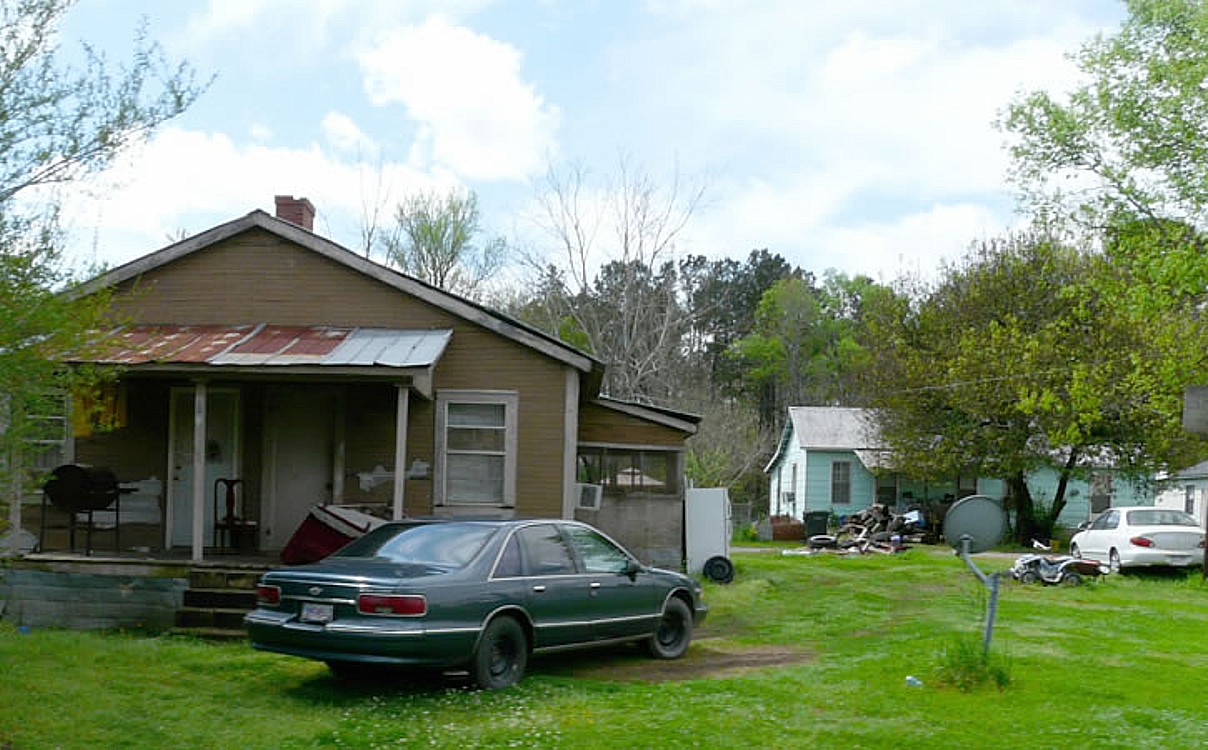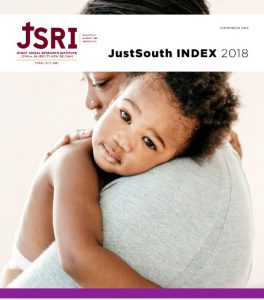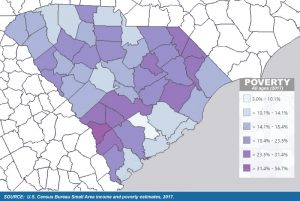
By Lindsay Street, Statehouse correspondent | Twenty-four dollars a day isn’t enough to allow the state’s poorest residents to access opportunities and escape the cycle of poverty, according to low-income nonprofit leaders.
According to new numbers from an index using U.S. Census numbers, the average daily income in South Carolina’s poorest households is $36, and at least $12 of that goes toward rent.
The Palmetto state is ranked 43rd nationally on poverty, according to the 2018 JustSouth Index recently published by Loyola University New Orleans Jesuit Social Research Institute. It reported:
- The average annual income for the state’s poorest households is $13,266.18,
- 26.3 percent of the state’s poorest people are without health insurance, and
- 61.9 percent of the state’s poorest people have housing costs exceeding 30 percent of their income.
 For those who work with low-income South Carolinians, the results of the index were not surprising.
For those who work with low-income South Carolinians, the results of the index were not surprising.
“We don’t have the strategy or plan for getting people out of poverty. In fact, just the opposite, we want to cut their benefits or cut their food stamps,” Palmetto Project Executive Director Steve Skardon said. “We are unwilling in South Carolina to bring about systemic change that would bring about a different result than we’re getting right now.”
The Loyola report primarily focused on Gulf coast states, but included a ranking for all 50 states and Washington, D.C.
“The lowest ranked states are, as a whole, heavily concentrated in the South. Looking just at the 11 former Confederate states, 10 of them are in the bottom 14 positions in our Index,” according to the report.
Among the poverty rankings, Minnesota was least impoverished, followed by Iowa. South Carolina was sandwiched by New Mexico at 42nd and Alabama at 44th. Texas and Mississippi were ranked 50th and 51st, respectively.
One in seven in S.C. live in poverty
According to the U.S. Census Bureau, 777,871 people in South Carolina, or about one in seven or 15.3 percent, live in poverty. Poverty is defined by the federal government as a one-person household earning less than $12,490 or a four-person household earning less than $25,750 (about $17 per person per day). Nationwide, 11.8 percent live in poverty. Only three counties in South Carolina are have less poverty than the national average: Beaufort, Greenville and York counties. By contrast, 37.3 percent in Allendale County live in poverty.
- Previous coverage: 130,000 children in the state are in poverty.
 “(Poverty) impacts individuals in every aspect of their lives from health to hunger to ability to have upward mobility and improve their lives,” SC Appleseed Legal Justice Center Director Sue Berkowitz said. “If you have such a large percentage of people in your state living at or near poverty … you have people who can never get ahead and it then means that things like health metrics are incredibly low.”
“(Poverty) impacts individuals in every aspect of their lives from health to hunger to ability to have upward mobility and improve their lives,” SC Appleseed Legal Justice Center Director Sue Berkowitz said. “If you have such a large percentage of people in your state living at or near poverty … you have people who can never get ahead and it then means that things like health metrics are incredibly low.”
Berkowitz said the state’s historical racism plays a role in perpetuating poverty. For so long, “so many people in our state were unable to accumulate any wealth and assets and that adds to poverty,” she said.
Aditi Srivastav of the Children’s Trust of South Carolina said poverty becomes “a community systemic issue” that begins in childhood. Children in poor homes don’t have access to food, making it difficult for them to learn in schools. They also don’t have access to better schools, or good transportation that allow for better opportunities, she said. And all of those things — food insecurity, poor transportation, lack of work opportunities — contribute to poor health outcomes, she added.
- Read a United Nation’s report that found worldwide inequality isn’t just about access to jobs, but also access to education, technology, career advancement, and more.
What to do about it
The JustSouth Index offered these actions steps to reduce poverty:
- Increased wages. A full-time worker earning the federal minimum wage of $7.25 and working 50 weeks a year earns about $13,266.18 — the average income of the state’s poorest households. The report called boosting the state minimum wage law “a powerful tool” in combating poverty. Skardon said: “Most poor South Carolinians work. It’s just that the jobs they have are not sufficient.”
- Earned Income Tax Credits. State Earned Income Tax Credits, like the one now available in South Carolina, have been “highly effective” for helping families out of poverty, the report said.
- Expand Medicaid. South Carolina and many Southern states declined expansion of Medicaid under the 2008 Affordable Care Act. The report said expanding access to the program, which is limited to adults earning 67 percent of the poverty level. Had Medicaid been expanded, eligibility would have been expanded to those earning 138 percent of the poverty level. Read about how deaths have been attributed to states not expanding Medicaid.
- Outreach for health connections. The report said states should engage in outreach activities to encourage enrollment among rural and immigrant residents.
- Affordable housing incentives. The report said the state should offer incentives to developers and municipalities to encourage affordable housing development. It also suggested supplementing federal housing programs.

“A first step in breaking the cycle of poverty in South Carolina is rethinking our understanding of its root causes. Policymakers for the most part still think poverty is caused by lazy people who don’t want to work,” Skardon said. “This thinking is what fuels the persistence of poverty and exacerbates income inequality.”

Berkowitz agreed that paying a living wage and increasing health care coverage are key in combating poverty.
“We (shouldn’t) penalize people and treat them badly because they are living in poverty,” she said.
Srivastav said poverty affects everyone in the state.
“If we don’t address poverty everybody suffers,” she said. “Everybody has to kind of change their mindset and recognize that just because me and my family is flourishing doesn’t mean I don’t have a role to play in helping others to do the same.”
- Have a comment? Send to: feedback@statehousereport.com


